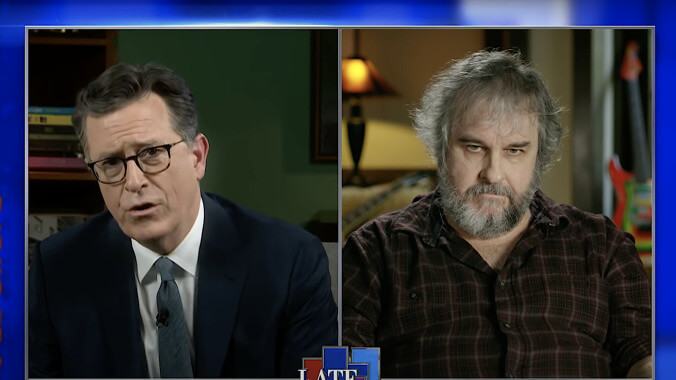Stephen Colbert makes Peter Jackson recast The Lord Of The Rings with The Beatles
To be fair, Colbert keeps his 'no-LOTR talk' promise for most of their interview

Appearing remotely from his home in Wellington, New Zealand due to COVID restrictions couldn’t keep Peter Jackson safe from Stephen Colbert’s various manias on Wednesday. Naturally, everybody is aware of how Gollum-esque is Colbert’s love of peppering the director with questions about Colbert’s precious Lord Of The Rings. But, in their extended chat about Jackson’s upcoming, four-years-in-the-making, three-part Beatles documentary series, The Beatles: Get Back, Colbert largely kept to his initial pledge to refrain from talking Tolkien in favor of what he, rather shockingly, admitted might be his new favorite trilogy from the director.
With Jackson telling Colbert that they could get in a lot of trouble should the host reveal that he was allowed to watch some of the top secret raw footage culled from the band’s famous final sessions, the pair yet reminisced about the mutually emotional experience. “I seem to remember we even shed tears that night,” Jackson noted, as the two Beatlemaniacs spoke feelingly about what Jackson promises will be a more complex and nuanced portrait of the end of the legendary band. “They love each other,” explained Jackson, “They’re having an enormous amount of fun,” continuing to belie the fractious and snippy version of the band captured in director Michael Lindsay-Hogg’s 1970 documentary, Let It Be.
And while Colbert does break his no-Lord Of The Rings promise near the end of the duo’s second segment, it’s really all Jackson’s fault. Setting the scene for a poignant sequence in his documentary, Jackson—unprompted by Colbert, it must be said—draws a parallel between Paul and Ringo and a particular pair of hobbits. The scene in question shows McCartney and Starr as, essentially, the last two remaining Beatles, as George Harrison had left the band abruptly, and there was serious question whether John Lennon’s studio absence was just John being John or evidence that he’d followed George out the door.
 Keep scrolling for more great stories.
Keep scrolling for more great stories.
